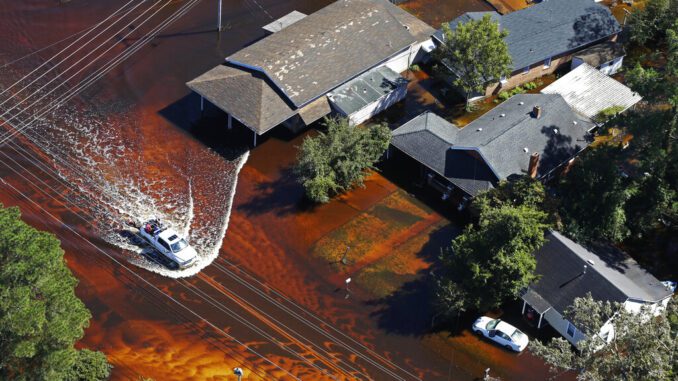
RALEIGH — Following a series of legislative subcommittee hearings on hurricane response failures by offices housed under the Department of Public Safety, a new advisor will be joining the department’s recovery efforts.
The N.C. Department of Public Safety (DPS) announced Richard J. Trumper would be serving as its Senior Advisor for Disaster Recovery beginning Feb. 1. Trumper is currently the executive director of Disaster Recovery with the Office of State Budget and Management.
According to a DPS statement, Trumper will “support initiatives to build long-term and stable recovery for North Carolinians following natural disasters.” He will work with the N.C. Office of Recovery and Resiliency (NCORR) and N.C. Emergency Management (NCEM) to get disaster victims “back in their homes faster.”
“Our state has made substantial progress recovering from hurricanes Matthew and Florence, but we still have a long way to go,” DPS Secretary Eddie M. Buffaloe, Jr. said. “Richard Trumper brings a wide range of experience and expertise that will support a core mission of rebuilding homes and communities as fast as possible after a disaster, while also making them more resilient in the future.”
“I look forward to joining the Department of Public Safety and establishing new partnerships that will speed up the recovery process and help families return home more quickly,” said Trumper in the statement. “My goal will be to build on the good things we’re already doing.”
“Trumper is a North Carolina licensed general contractor who joins the department with more than 22 years of experience, including program management, construction management, disaster recovery, reconstruction and restoration, mitigation and disaster damage assessment,” according to DPS.
Trumper’s position is different from the heads of NCORR and NCEM and he will apparently report directly to Buffaloe.
NCORR and its slow activity in getting residents back in their homes following Hurricanes Matthew and Florence was scrutinized during multiple legislative hearings last fall.
Among the recovery programs is Rebuild NC, a program under NCORR that was established in October 2018 to aid families impacted by Hurricanes Matthew and Florence. Per Gov. Roy Cooper, the purpose of NCORR was to “streamline recovery programming and assistance.”
Legislators grilled Laura Hogshead, the current head of NCORR, on the slow progress of her department and that of Rebuild NC.
Hogshead was named director of NCORR on Jan. 1, 2019. Previously, she served as Chief Operating Officer and Deputy Chief of Staff for Budget and Policy at the U.S. Department of Housing and Urban Development (HUD).
During the first hearing in September 2022, Hogshead took ownership of the failures, telling lawmakers that “This recovery is not going as you want it to go. It’s not going how I want it to go, and it’s certainly not going how the families sitting behind me and out in eastern North Carolina want it to go. And that is on me.”
NCORR is responsible for managing the $778 million in federal disaster relief received from HUD for both hurricanes Matthew (2016) and Florence (2018).
As of updates presented at the subcommittee hearing in December 2022, only around 60% of the federal funds have been encumbered and just $231 million have actually been spent by that time. The deadline for the funds to be spent or encumbered was a concern voiced by several lawmakers. Funds for Matthew must be spent by 2025 and funds for Florence by 2026.
In her presentation at the hearing, Hogshead stated 277 projects were successfully bid in 90 days since the first hearing and that 95 families had successfully been housed in the 83 days spanning the period of Sept. 9 through Dec. 7.
Hogshead also told lawmakers her agency helped 100 families since the previous hearing in September. Lawmakers pressed for more details about those families. Hogshead said 76 had completed construction projects and 24 had opted for a check to reimburse them for their out-of-pocket home repairs.
During that hearing, Hogsheads said Rebuild NC had completed just 889 out of 4,313 homes on its list. In September, she had reported 789 homes out of a total 4,197 were completed.
Those numbers are different than reported by OSBM’s Disaster Recovery (OSBM DR) office which manages over $50 million in funds through the Disaster Recovery Acts instituted by the legislature for Matthew and Florence. In addition, OSBM DR is responsible for overseeing over $136 million in other disaster recovery relief.
In the September hearing, Trumper said his department so far had aided 903 of a total 927 families seeking hurricane recovery housing assistance. He also said a little over 100 applicants had been rejected.
Based on Hogshead’s testimony, before COVID the Rebuild NC completion average was 31 homes a month. During 2020, the average fell to 23. In 2021, the impact of the pandemic dropped the average to just eight completions a month and the first six months of 2020 only saw an average of five homes completed.
The Hurricane Response subcommittee was formed under the Joint Legislative Commission on Governmental Operations in July 2022.


